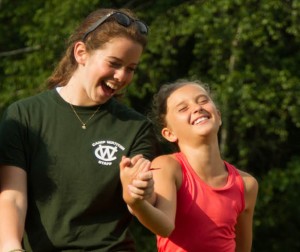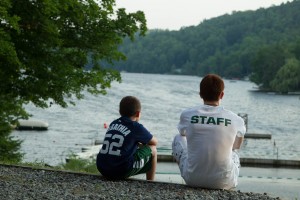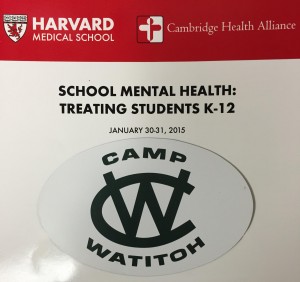Each summer, Watitoh campers board the camp bus in Yonkers and Montreal, looking forward to the “summer of their life.” Parents and children alike, talk about special events, camp traditions, cabin mates, counselors, and living the dream. What few of us ever talk about, specifically, is that camp offers an environment that provides good physical and mental health.
A couple of weeks ago, Britton attended a course at Harvard Medical School, titled School Mental Health: Treating Students K-12. Over 1,000 Mental Health Professionals gathered for two days to hear 12 speakers on such topics as Adolescent Brain Development, Preventing School Violence, Teens and Social Media, and many more.
While many of  the speakers had wonderful insight to share, it was Dr. Raymond Flannery Jr., an Associate Clinical Professor of Psychiatry that really made the camp connection. He explained that, good physical and mental health is all related to how a child interacts with others and the relationships that he/she forms with peers, adults, and mentors. Dr. Flannery’s research confirms the importance of what we do all summer long.
the speakers had wonderful insight to share, it was Dr. Raymond Flannery Jr., an Associate Clinical Professor of Psychiatry that really made the camp connection. He explained that, good physical and mental health is all related to how a child interacts with others and the relationships that he/she forms with peers, adults, and mentors. Dr. Flannery’s research confirms the importance of what we do all summer long.
Our campers engage in “caring attachments” every minute of every day at Watitoh. From peer friendship, to counselor relationships, to adult interactions outside of the bunk, these bonds are what our campers leave with every summer.
Friendship is at the heart of what we do. The cabin unit provides a close-knit family, where children feel empowered by each other. The individual boys and girls campus’ provide a larger family and an opportunity to get-to-know campers of all ages. Camp friends allow us to be ourselves, to feel emotionally safe to explore our own identity, and help us feel good about ourselves, both physically and emotionally. These “caring attachments” last a lifetime.
Camp counselors have an incredible ability to reach kids in a unique way. It is a beautiful, non-judgmental relationship, full of trust, relatability, and role-modeling. It is often the case that camp counselors are able to motivate, encourage, and support campers who are trying new things and stepping outside their comfort zone. Many of our campers attribute their positive camp experience to the “caring attachments” with their counselors.
 Lastly, the relationships that campers form with adults at camp, outside of their cabin counselors, represent the importance of having adults in a child’s life other than their parents. Camp directors, head counselors, specialty directors, and coaches, help campers explore independence and are able to boost self-confidence outside of the comforts of home. From these “caring attachments,” campers gain skills that they will ultimately use at every stage of life.
Lastly, the relationships that campers form with adults at camp, outside of their cabin counselors, represent the importance of having adults in a child’s life other than their parents. Camp directors, head counselors, specialty directors, and coaches, help campers explore independence and are able to boost self-confidence outside of the comforts of home. From these “caring attachments,” campers gain skills that they will ultimately use at every stage of life.
Our Watitoh campers are lucky to spend their summer enveloped in a community that fosters these types of relationships and, live in an environment where they can develop and explore such “caring attachments.” What an incredible feeling to know that, when our campers board those buses, they are on the road to a place that provides the relationships that lead to a life full of good physical and mental health.




